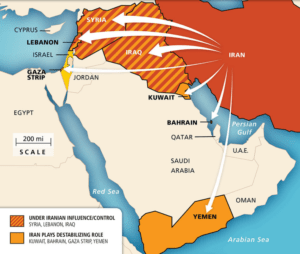President Trump pursues a policy combining military threat with economic warfare and his aim is to restore American hegemony especially in view of the rising contender: China. Beijing has been acquiring technological knowledge and started expanding beyond the borders, having easier access to Central Asia and the Pacific than Americans.
In 2015, when Trump stood for election, we wrote: “Trump’s war rhetoric is very popular with his audiences and is a step beyond Obama’s statement about American exceptionalism. In New Hampshire, Trump nearly declared war on China as he stated: ‘Take a look at China what they have done, they have taken our money, our jobs, our base, our manufacturing, and we owe them 1.5 trillion dollars that’s like a magic act, they have taken everything, and we owe them money.’ Mr Trump did not tell his audience that bringing back jobs comes at a cost. China’s GDP per capita is around 7,500 dollars, while the GDP per capita of the US is about 55,000 dollars. The China rhetoric is unambiguous; China stole what belongs to the US, and there is no need to repay US debt owed to China. The world should brace for Mr Trump as the 45th president of the USA.”
Gefira Financial Bulletin #34 is available now
- A hand of cards or the ongoing events
- Anti-Semitism of Indigenous Europeans?
- Greater Israel
President Trump wants to dictate to the whole world, but, taking into account the fact that the United States is now in conflict with Cuba, Venezuela, Iran, Syria, Russia, China and North Korea, a big war is not to be expected any time soon, so much so that the military interventions in Afghanistan, Iraq, Pakistan, Yemen and Libya appear to be inconclusive. Washington has an arsenal of other measures and these include:
- fighting a war by proxy like the financing Afghan resistance to Russians in the eighties of the previous century.
- imposing economic sanctions and blocking bank accounts. This has worked very well against small countries. It seems to be less effective in the case of Iran and almost ineffective in the case of Russia. China and Russia are accelerating their efforts to set up alternative payment systems and Europeans – recall Germany’s adherence to the Nord Stream 2 project in defiance of American pressure – are not willing to cooperate with the United States in this respect.
- sparking coloured revolutions like the 2004 Orange Revolution in Ukraine or the 2009 Green Revolution in Iran. The strategy has not always worked as expected: the attempt to overthrow the Venezuelan government has failed.
As an aside we might notice that these revolutions might also be used the the West’s enemies. They can only occur in politically and economically unstable societies and that is – increasingly – the plight of the United States and Europe, both riven with ethnic and religious divides. Iran, Turkey, Russia and China can arm factions within Europe and thus destabilize these countries from the inside, as the Americans have done in Syria. The Turkish government has an extensive network of Diyanet mosques that can distribute weapons in the suburbs of Paris, Lyon and Marseilles.
Washington is in two minds about its foreign policy. The Democrats wanted to continue the interference in the Middle East and especially in Syria, where during President Barack Obama’s tenure the Jihadists of almost every political hue were armed to expel President Bashar al-Assad. The Jewish lobby in Washington is striving for a confrontation with Iran, which may prove to be costly, though. The coalition forged by Tehran with Lebanon, Syria, and Iraq is viewed as a direct threat to Israel, which means that Tel Aviv will sooner or later have President Trump bomb Iran. Recall the 1981 Israeli raid on the Iraqi nuclear reactor.

Source: AIPAC pro-Israel Lobby
Though most of Trump’s supporters are not interested in a war with Iran, the tensions are likely to escalate. The Turks have already indicated that they are not prepared to pay a higher price for oil and may try to circumvent sanctions. Rumour has it that the Chinese have stopped buying Iranian oil. Probably the Chinese brought this news to deceive the American administration. The world economy cannot afford a high price for energy. If the American voter sees the oil price rise at the pump as a result of another useless war, this will not help President Trump in the elections on November 3, 2020. Alas! Read more in Gefira 34





2 comments on “The road to modern wars”
What is the source of the picture?
Oil well fires rage outside Kuwait City in the aftermath of the First Gulf War. Retreating Iraqi troops set fire to Kuwait’s oil fields. Mar. 21 1991. – Image
https://www.shutterstock.com/image-photo/oil-well-fires-rage-outside-kuwait-244390672?studio=1